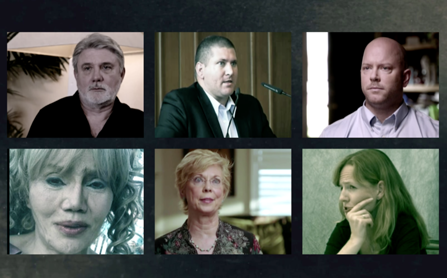
-
HOME
-
WHAT IS STANDOur Mission Our Values Our Help Contact
-
WHAT WE FIGHT FORReligious Freedom Religious Literacy Equality & Human Rights Inclusion & Respect Free Speech Responsible Journalism Corporate Accountability
-
RESOURCESExpert Studies Landmark Decisions White Papers FAQs David Miscavige Religious Freedom Resource Center Freedom of Religion & Human Rights Topic Index Priest-Penitent Privilege Islamophobia
-
HATE MONITORBiased Media Propagandists Hatemongers False Experts Hate Monitor Blog
-
NEWSROOMNews Media Watch Videos Blog
-
TAKE ACTIONCombat Hate & Discrimination Champion Freedom of Religion Demand Accountability
Scientology: If You Don’t Know, Don’t Pretend to Know
When I hear attacks on people or groups in the media, I notice the attackers provide all the trimmings of “objectivity” when there is no objectivity.
Videos of those attacked show people in awkward positions or with lighting that makes them look odd and sinister.

The “experts” interviewed are given softball questions, leading questions, etc. They are never challenged. They usually include “experts” whose authority comes from the fact that they were once members of the group or friends of the person now in question. Such people are never challenged. No one asks the obvious questions: “Hey, bud, you were a member of that group and went along with it for years? If it’s as bad as you say, how come you were so stupid, and if you were so stupid then, why should we listen to you now?”
And they don’t ask: “Why should we accept as truth what a man who has left and betrayed a group he once claimed to love has to say now?”
Members of the attacked group or supporters of the attacked person get no softball questions, get interrupted every 30 seconds and challenged—or we are shown only a 20-second denial by a spokesperson who probably spoke for several minutes.
We know the group is bad. How do we know? Because these good people tell us so. How do we know they are good people? Because they left the group, which was bad. Logical? No.
There are many other ways the media undermine objectivity.
Here’s my perspective on this as a Scientologist:
There are millions of us. I personally know several thousand Scientologists and know OF thousands more. I also know many people who have been Scientologists, but are not now active in it, yet do not attack it and say they value what they got out of it. But when a TV station does a show on Scientology, it will introduce the same handful of critics, a kind of road-show of selected “ex-Scientologists” every time. The implication is that the statements of these few people are more valid than would be the statements of millions of people active in Scientology and being helped by it.

If it were Christianity under attack, the media (by analogy) would introduce Judas as an ex-Christian who’d been very close to “their founder,” one of His apostles, and Judas would tell us how bad it all was. “And did Christ treat you badly?” “Did he set you up to betray Him?” etc. Judas would weep and tell his story for 30 minutes. Then in a 30-second blip from a longer interview, a very serious-and-official-looking St. James or St. Peter or the like would be shown giving a brief denial (but no sobbing, no tragic appearance). The announcers would talk at length about people being hypnotized to believe water is wine or that dead men can be brought to life. They would not bring on people helped by Christ. They would not show Christ giving his Sermon on the Mount (that would be too common-sensical).
One assumption implicit in such presentations is that the group is bad, and therefore those who’ve left the group must be good, so they can be believed. This is circular: We know the group is bad. How do we know? Because these good people tell us so. How do we know they are good people? Because they left the group, which was bad. Logical? No.
Another assumption is: these people are reliable witnesses, objective, because they are no longer in the group. The current members of the group cannot be believed, because they are brainwashed “believers.” They can’t be objective about the group because they are still in it. That’s the odd notion that makes Judas the “objective” judge of Christianity.

In fact, in many cases the attackers are NOT “good people”: they were kicked out of the group for reasons not brought up—financial irregularities, sexual misbehavior, physically attacking others, etc. Usually what they accuse others of having done turns out to be what THEY did. But this is something much documented online for any who choose to look.
Anyone who has ever read a good history book will know that the person who leaves a group—and especially one who has been thrown out of the group or asked to leave or demoted for malfeasance—is FAR from objective, is bitter, needs to make the group wrong in order to make him or herself right. If a group kicks me out, I’m not going to say nice things about it because to do so is to admit my own failures and crimes.
Yes, a group member may be prejudiced in its favor, likely to see the best of it, but nowhere near as prejudiced as the person who, having pledged support for the group, leaves it and attacks it. Objectivity would be giving those IN the group at least as good a chance to speak out as the group’s enemies. Objectivity depends on presenting both sides.
I hope, when you watch the news, ANY news, you are aware of the gimmicks that mislead, the feigned objectivity of “friendly” or “authoritative” voices, the one-sided documentation and all the possibilities that crucial information has been distorted or omitted.

I once participated in a protest march—back in the early ’90s in Berlin. At that time, the German government was passing discriminatory laws and publishing lies about our church. All this has since been handled, and Scientology is flourishing in Germany, but at that time we were under attack. There were about 12,000 of us in the march (we counted). We came from the United States and many other nations. I saw 800 Hungarian Scientologists getting off a long line of buses. Eight hundred from that nation alone! We filled up many long blocks of city street. At one point of the march, on a small island in the street, there were seven protesters against our march. That’s right—I counted seven of them. They held up signs attacking Scientology. So there were 12,000 of us, seven protesters attacking us.


The next few days I saw articles about the march in a couple of German newspapers, The Washington Post, The New York Times, USA Today. All but one of the papers said there were about 100 marchers. USA Today doubled that—200 marchers. In some newspapers they gave EQUAL SPACE TO THE SEVEN ANTI-MARCH PROTESTERS. One German newspaper gave more coverage to these guys, interviewed them and wrote of their holding a meeting after the march. The article was vague about how many of them there were. It just gave them as an “objective source” for what they wanted to say about us.
I have never since that march had any doubts about the corruption of our mainstream media. One hundred people looks nothing like 12,000 people. Did you ever watch a parade of 12,000 people down a city street? How long did it take for the entire parade to pass by?
We eventually won that particular battle—and many others. But we didn’t win it by waiting for newspapers to say nice things about us.
I hope, when you watch the news, ANY news, you are aware of the gimmicks that mislead, the feigned objectivity of “friendly” or “authoritative” voices, the one-sided documentation and all the possibilities that crucial information has been distorted or omitted.
I won’t argue that Scientology is for everyone or even that you should take a Scientology course and see for yourself. I ask only that if you do NOT do that, you recognize that you have NOT inspected for yourself, but have received only the jaundiced opinions of people who are not necessarily truthful.
In other words, if you don’t really know, then don’t pretend to know.









